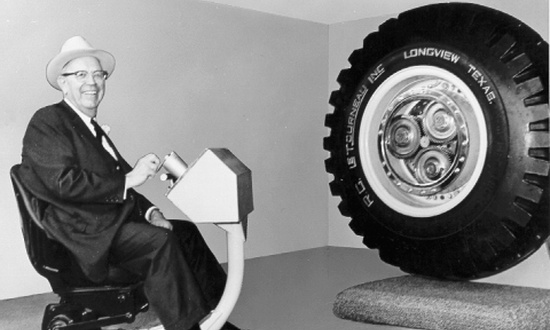In her article How ‘Christian’ Should My Small Business Be?, Laura Baxter offers five principles for business owners wondering how to honor Christ with their companies. As she emphasizes, Christians in business should set fair prices and honest scales (Deuteronomy 25:13-16; Proverbs 16:8; Proverbs 20:10). Believers will tell the truth—the whole truth—when they sell a car, house, product, or service. They know that God is watching and will hold them accountable for how they conduct their business (2 Corinthians 5:20).
I would add one more point to her article: Seek to honor Christ with the resources He has entrusted to your business. (When a reader asked about whether as a business owner they should tithe on their gross or net income, here was my answer.)
John Piper writes in Desiring God, “God does not prosper a man’s business so he can move from a Ford to a Cadillac. God prospers a business so that 17,000 unreached peoples can be reached with the gospel. He prospers the business so that 12 percent of the world’s population can move a step back from the precipice of starvation.”
I had a phone conversation with a man who had recently read The Treasure Principle. He owns a profitable business and now believes for the first time that he knows why God has blessed him financially. It’s not so he can drive nicer cars and live in a nicer house. It’s to give it to build God’s kingdom. As I told him about a dozen different missions groups, pro-life projects, prison ministries, and ways to help persecuted Christians, he was moved by all the wonderful investment options. He finished our conversation determined to liquidate more assets to dramatically expand his eternal investment portfolio. I wish you could have heard the excitement in his voice. This man isn’t a reluctant, guilt-ridden giver. He’s a man who has been released from material bondage. He’s thrilled to have finally gotten onboard with what matters!
In sharing this, I don’t want to dismiss that it’s been a challenging last year for many small businesses. My heart goes out to business owners who have struggled to keep their businesses afloat. Honoring God with the resources He’s entrusted to us doesn’t always mean things will go smoothly, that we’ll have a prosperous business, or that God must always give back to us exactly what we give up, or ten or a hundred times more, in some kind of karma-like transaction. Sometimes He gives us joy or patience or endurance as we make real sacrifices for Him—and such intangible gifts are precious.
 Consider these stories about Christian business owners, from my book Giving Is the Good Life. Their examples can inspire us and give us footsteps to follow:
Consider these stories about Christian business owners, from my book Giving Is the Good Life. Their examples can inspire us and give us footsteps to follow:
Out of a deep love for Jesus, Pete and Debbie Ochs decided to acquire a business constructing industrial products in prisons. They employ inmates, some of whom have committed violent crimes. They invest in these prisoners’ lives by offering life lessons on topics like parenting, finances, and relationships. Pete says, “In one of our life lessons, we presented this whole concept of generosity and challenged [the prisoners] that we would match dollar for dollar any dollar that they gave to one of a number of charities and we gave them a list. It was amazing the amount of money that these prisoners gave to charity. . . . Most of the charities . . . existed to help the victims of the crimes that they committed.”4
Pete’s ministry to prisoners reflects the heartbeat of Scripture. Ephesians 4:28 says, “Anyone who has been stealing must steal no longer, but must work, doing something useful with their own hands, that they may—”
That they may what? Have only enough to live on so they no longer have to steal? No. “That they may have something to share with those in need” (NIV, emphasis added). Giving isn’t just for those with squeaky-clean records; it’s for all of us.
Pete and Debbie’s overflowing good life has not only brought these men the gospel but has also introduced them to the overflow of joyful giving so they, too, can experience abundant life.
Henry Kaestner’s company, Bandwidth, received a lucrative contract they really needed to stay afloat. When they discovered that business’s affiliation with the adult entertainment industry, Bandwidth could have looked the other way. But they knew that would put them at odds with God’s principles. Heeding the warnings in his Word, they canceled the deal. Soon their financial position looked bad.
Sometimes making ethical business decisions reduces profits. Refusing to compromise morally can even result in a failed business.
In Henry Kaestner’s case, Bandwidth turned around dramatically after that decision, becoming the fourth-fastest-growing privately held company in the country. For a while, Henry and his wife, Kimberley, gave away 20 percent of their income, thinking double tithing was impressive. But Henry said, “[God] wants our hearts. Now we can give much more radically. We intend to give away half, and the lion’s share of the rest is invested in Christian-led private companies in Asia.”
Henry added, “There’s an incredible joy when you participate in the work of God. It’s remarkably fulfilling, because it fills up the hole that would otherwise contain idols that take the place of God.”
Dave and Jessica Lindsey were invited to help build a house for a Mexican family, which dramatically changed their perspective on generosity and what it means to love the poor. Later, they and their three children served for three months in Japan with a mission group. They shared their one-bedroom apartment with three single staff men, who slept in the living room. They had one bathroom and a tiny kitchenette. That challenging experience heightened their sense of world need and made them want to do more to make a difference.
The Lindseys decided they shouldn’t keep these experiences to themselves. So their $450 million company, Defender Direct, now sends hundreds of employees and their families to Mexico every year to build homes, paying all expenses.
The giving only grew from there. Defender employees are also given days off to volunteer, and they are invited to participate in what the Lindseys call the Super Service Challenge. After employees volunteer with a ministry, they’re asked, “What would this nonprofit do if they were given $5,000 or $10,000?” The chosen teams win that amount of money for the charity they serve. Dave says, “We went from being a giving company to a company of givers. It is really fun to work at a company full of givers.” He adds, “There is a greater purpose for our business than simply making money.” That purpose is not only to give away profits but also to create a climate in which people see giving consistently modeled. Generous giving becomes the conscious norm rather than the occasional exception.
When he was young, Matt McPherson sought the Lord’s direction for his life. Matt built archery bows and asked God for the wisdom to build the best bows in the world. He developed the single cam bow and now owns one of the world’s largest archery bow companies.
Matt started other business ventures, including McPherson Guitars, which he began with his father. Their goal is to make money to impact the world. They now fully support more than seven hundred missionaries worldwide.
Matt’s story is another one that makes me thank God for furthering His Kingdom by not calling some people to spend their lives as pastors or missionaries—people such as Stanley Tam, Art DeMoss, David Green, and a number of others whose stories I tell in Giving Is the Good Life. There are millions of faithful business and professional people, including musicians, artists, and athletes, spread across the world. If Matt has fully funded seven hundred missionaries, how many tens of thousands of other missionaries have been able to go do their work because believers in secular vocations have faithfully used their gifts and passions to build businesses that generously send and support them? And while supporting missionaries, they themselves serve Christ in the unique mission fields of their businesses and neighborhoods.
I recommend Wayne Grudem’s excellent but not-well-known book Business to the Glory of God.
Photo by Christin Hume on Unsplash




